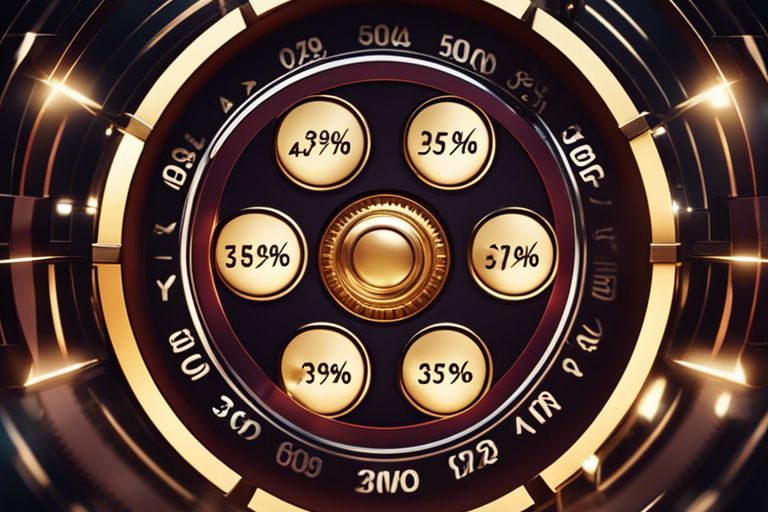Balancing the Odds – Slot Game Algorithms Explained

Most players are familiar with the thrill of playing slot games, but few understand the intricate algorithms that determine their outcomes. In this detailed guide, we will investigate into the complex world of slot game algorithms, shedding light on how these sophisticated systems work to balance the odds in this popular form of gambling. By the end of this post, you will have a comprehensive understanding of the inner workings of slot games and how their algorithms impact your chances of winning.
The Basics of Slot Machines
While slot machines may appear to be simple games of chance, there are intricate algorithms and mechanisms at play that determine the outcome of each spin. Understanding the basics of slot machines is fundamental to grasping how these games operate and how players can maximize their chances of winning.
Historical Development of Slot Games
Basics: Slot machines have a rich history that dates back to the late 19th century. The first mechanical slot machine was invented by Charles Fey in 1894, known as the Liberty Bell. Over the years, these machines evolved from mechanical to electronic, paving the way for the digital slots we see in casinos today. The development of slot games has been marked by innovations in technology and the constant drive to make them more exciting and engaging for players.
Understanding Random Number Generators (RNG)
Random: Central to the operation of modern slot machines is the Random Number Generator (RNG). This sophisticated software algorithm ensures that each spin outcome is entirely random and independent of previous spins. RNGs are regularly tested and certified by independent regulatory bodies to ensure fair gameplay and compliance with gaming standards.
A: RNGs generate a sequence of numbers that correspond to the symbols on the reels. When a player presses the spin button, the RNG determines the outcome of the spin by selecting a random number for each reel. This process all happens within milliseconds, creating a seamless and unpredictable gaming experience for players.
Basics of Probability in Slot Machines
Machines: Probability plays a crucial role in determining the odds of winning on a slot machine. Each symbol on the reels has a specific probability of landing on the payline, which ultimately affects the overall likelihood of winning combinations. Understanding the basics of probability can help players make informed decisions about their betting strategies and improve their chances of winning.
Slot: It is important for players to remember that while slot machines are programmed to provide random outcomes, they are also designed to generate profits for the casino. This inherent house edge ensures that the odds are always slightly in favor of the house. However, with a solid understanding of the basics of slot machines and a bit of luck, players can still enjoy the thrill of the game and potentially walk away with some winnings.
The Mathematics Behind Slot Games
How Slot Machines Calculate Odds
Calculate Any slot game you play is based on complex mathematical algorithms that determine the odds of winning. Slot machines use random number generators (RNGs) to calculate the outcomes of each spin. These algorithms ensure that every spin is independent of the previous one, making it impossible to predict the outcome.
Payback Percentages and House Edge
Percentages The payback percentage of a slot machine refers to the amount of money that the game will return to players over time. It is the opposite of the house edge, which is the advantage the casino has over players. Slot games typically have a payback percentage ranging from 75% to 99%, with the house edge built into the game’s design.
The payback percentage and house edge are crucial factors to consider when playing slot games, as they directly impact your chances of winning. Understanding these percentages can help you make informed decisions about which games to play to maximize your chances of winning.
The Role of Volatility in Slot Payouts
Payouts The volatility of a slot game refers to how risky it is to play. High volatility slots offer bigger payouts but less frequently, while low volatility slots have smaller but more frequent wins. Understanding the volatility of a slot game can help you choose the right game based on your risk tolerance and playing style.
Games Slot games are carefully designed to provide players with an exciting and entertaining experience while ensuring the odds are in favor of the casino. By understanding the mathematics behind slot games, you can approach playing with a clearer understanding of how these games work and make more informed decisions to enhance your gaming experience.
Slot Machine Algorithm Design
The Algorithmic Structure of Slot Games
Now, the design of slot machine algorithms is a crucial aspect in the development of slot games. These algorithms determine the outcomes of the game, including the symbol combinations displayed on the reels and the payout percentages. Machine designers use various mathematical and statistical models to create these algorithms, ensuring an engaging and fair gameplay experience for players.
Ensuring Fairness and Compliance
For slot machine algorithms to be deemed fair and compliant with gaming regulations, they must undergo rigorous testing and certification by independent testing labs. These labs evaluate the algorithms to verify that they produce random results and meet industry standards for fairness. Compliance with these standards is important to maintain the integrity of the gaming industry and protect players from fraud.
Algorithm designers work closely with regulatory bodies to ensure that their algorithms adhere to the required standards for fairness and compliance. This collaboration helps to establish trust in the gaming industry and ensures that players can enjoy slot games with confidence in the integrity of the algorithmic design.
The Impact of Pseudo-Randomness
Algorithm designers often implement pseudo-random number generators to introduce an element of unpredictability in slot game outcomes. These generators produce sequences of numbers that appear random but are actually determined by an initial seed value. This use of pseudo-randomness enhances the gameplay experience by creating a sense of excitement and anticipation for players.
Compliance
Compliance with regulatory standards is crucial when implementing pseudo-randomness in slot machine algorithms. By ensuring that pseudo-random number generators are properly tested and certified, designers can demonstrate that the algorithms produce fair and unbiased results. This commitment to compliance helps to build trust among players and regulators in the transparency and integrity of slot game algorithms.
Advanced Slot Game Features
For a deeper understanding of how slot game algorithms work, let’s explore into some advanced features that can significantly impact gameplay. Here, we will explore bonus rounds, progressive jackpots, and player interaction, shedding light on how these elements influence the algorithms behind slot games.
Bonus Rounds and Their Influence on Algorithms
Bonus rounds are a common feature in slot games that can greatly affect the algorithms at play. When triggered, these rounds introduce new mechanics or mini-games that offer players the chance to win extra prizes or free spins. From a mathematical perspective, bonus rounds can alter the volatility of a slot game, impacting the frequency and size of potential payouts.
Understanding how bonus rounds influence algorithm outcomes can help players strategize their gameplay. Some bonus rounds may be more lucrative than others, depending on how they are designed within the game’s algorithm. By studying the patterns and behaviors of bonus rounds, players can enhance their chances of landing significant wins.
Role of Progressive Jackpots in Slot Algorithms
Their presence of progressive jackpots in slot games adds an exciting dimension to gameplay while also affecting the underlying algorithms. Progressive jackpots are pools of money that increase every time the game is played but the jackpot is not won. As more players participate, the jackpot grows, creating the potential for massive payouts that can alter the game’s overall payout percentage.
Progressive jackpots are both a blessing and a risk for players. The allure of a massive, life-changing jackpot makes these games highly popular, but they also come with lower odds of winning due to the jackpot contribution. While the chance of winning a progressive jackpot is slim, the rewards can be astronomically high, making them a high-risk, high-reward feature in slot game algorithms.
Effects of Player Interaction on Outcomes
Algorithms in slot games can also be influenced by player interaction, introducing an element of skill or strategy into what is typically considered a game of chance. Features like skill-based bonus rounds or interactive mini-games can give players more control over their outcomes, potentially impacting the frequency and size of their wins.
Player interaction adds an engaging layer to slot games, allowing players to feel more involved in the gameplay experience. By utilizing their skills or making strategic decisions during interactive segments, players can increase their chances of triggering bonuses or landing more significant payouts. This element of control can make slot games more appealing to those seeking a more immersive and dynamic gaming experience.
Player Behaviors and Slot Algorithms
Understanding the Gamblers' Fallacy
After countless hours spent spinning the reels, some players fall into the trap of the Gamblers’ Fallacy. This psychological phenomenon convinces players that past outcomes will influence future results. For example, believing that after a series of losses, a big win is inevitable. However, it’s vital to understand that each spin of the slot machine is independent and not influenced by previous outcomes. Players must recognize that every spin has the same odds of winning, regardless of past results.
How Slot Algorithms Respond to Betting Patterns
One of the fascinating aspects of slot algorithms is how they respond to betting patterns. Slot algorithms are designed to operate independently and randomly, ensuring fair gameplay. They are programmed to generate random outcomes for each spin, making it impossible to predict when a winning combination will appear. These algorithms use complex mathematical equations to determine the outcome of each spin, ensuring that the game remains unpredictable and exciting for players.
However, some players may believe that they can predict the outcome of a slot game based on their betting patterns. This is a common misconception as slot algorithms operate independently of player behavior. No matter how a player bets, the algorithm will generate outcomes randomly, ensuring that each spin is fair and unbiased.
Modern Technologies in Slot Gaming
The Integration of AI and Machine Learning
Modern slot gaming has seen a significant transformation with the integration of Artificial Intelligence (AI) and Machine Learning technologies. Unlike traditional slot machines that operated on predetermined algorithms, AI and Machine Learning allow for a more dynamic and adaptive gaming experience. These technologies analyze player data and behaviors to create personalized gaming experiences and offer tailored bonuses or rewards based on individual preferences.
Networked Systems and Remote Algorithm Updates
Technologies in slot gaming have advanced to incorporate networked systems that enable remote algorithm updates. This means that the algorithms running the slot games can be continuously optimized and fine-tuned without disrupting the players’ experience. With networked systems, casinos can also monitor and manage their gaming platforms in real-time, ensuring fair gameplay and security.
Machine learning algorithms can identify patterns in player behavior and preferences more effectively, leading to a more personalized gaming experience. However, the use of remote algorithm updates raises concerns about data privacy and security. It is crucial for casinos to implement robust encryption and security measures to protect player information and ensure a safe gaming environment.
Ethical and Legal Considerations
Responsible Gambling and Algorithm Transparency
Keep in mind that developers and operators of slot games have a responsibility to promote responsible gambling practices. An imperative aspect of this is ensuring transparency in the algorithms used in slot games. This transparency helps build trust with players, allowing them to understand how the game operates and the odds of winning. By providing clear information on how the algorithms work, operators can help players make informed decisions about their gambling habits.
Regulatory Standards and Algorithmic Auditing
With the rise of online gambling, regulatory bodies have implemented standards to ensure the fairness and integrity of slot game algorithms. These standards often require operators to undergo regular audits to verify that their algorithms are functioning as intended and not rigged in favor of the house. Compliance with these regulations is crucial for maintaining a trustworthy gaming environment for players.
Understanding and adhering to regulatory standards is imperative for online casino operators to protect players and maintain the integrity of their platforms. The auditing of algorithms helps to prevent manipulation and ensures that games are operating fairly and transparently. Operators must work closely with regulators to guarantee compliance and build trust with their player base.
Final Words
The algorithms behind slot games are carefully designed to ensure fairness and randomness in each spin. By understanding how these algorithms work, players can make more informed decisions and potentially improve their chances of winning. Do not forget, slot games are ultimately games of chance, and there is no foolproof strategy to guarantee a win. It’s necessary to approach them with a sense of fun and entertainment, rather than a way to make money.
FAQs:
What determines the outcome of slot games?
The outcome of slot games is determined by sophisticated algorithms known as Random Number Generators (RNGs), ensuring each spin is entirely random.
Do slot machines have a built-in advantage for the casino?
Yes, slot machines are designed with a house edge to ensure profitability for the casino, although players can still win with luck and understanding of the game.
How do bonus rounds affect slot algorithms?
Bonus rounds can alter the volatility of slot games, impacting the frequency and size of potential payouts by introducing new mechanics or mini-games.
Can players predict slot outcomes based on their betting patterns?
No, slot algorithms operate independently of player behavior, generating random outcomes for each spin regardless of betting patterns.
What role do AI and Machine Learning play in modern slot gaming?
AI and Machine Learning technologies personalize gaming experiences, analyze player data, and allow for dynamic adjustments in gameplay, enhancing the overall gaming experience.
Recommended Posts

Understanding Casino Bonuses in a Snap
May 1, 2024

Unveiling the Sustainable Gambling Zone
May 1, 2024

Who’s Who in the iGaming World
May 1, 2024
